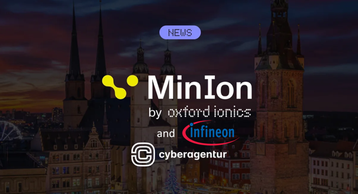Germany's cybersecurity agency, Cyberagentur, has signed €35 million of contracts for mobile quantum computers.
The three contracts were awarded to neQxt, Oxford Ionics together with Infineon Technologies, and Quantum Brilliance with Parity Quantum Computing (ParityQC).
The research objective of the "Mobile quantum computer – quantum processors for mobile use in defense and security applications" is to work on the miniaturization of quantum computers while maintaining a high performance.
The companies are looking to develop compact, lightweight, energy-efficient, and robust quantum computers for security and defense scenarios.
Mobile quantum computers do not need to be housed in data centers or have cloud access to be able to operate.
Oxford Ionics and Infineon Technologies team up on Min-Ion quantum computer
The Oxford Ionics and Infineon Technologies project is to develop a mobile ion trap quantum computer called Min-Ion.
Min-Ion will use Infineon's QPU technology and Oxford Ionics' Electronic Qubit Control technology to be able to run high-performance applications while remaining compact and mobile.
Infineon will provide the microfabrication of the large-scale ion trap chips that Oxford Ionics will use to build the computer.
The first generation of the system will have 32 high-fidelity qubits with a second generation planned to have 64 qubits. The team plans to continue to scale the system to reach 256 qubits and ultimately more than 1,000 qubits.
Dr. Chris Ballance, Oxford Ionics co-founder and CEO, said: “We are thrilled to be delivering the first mobile variant of our product line to Cyberagentur. Since our inception, we have viewed the challenge of building powerful quantum computers as an engineering project – not a science project.
"This approach has yielded both the highest-performing chips in the world and a robust technology that can deliver industry-leading performance within a small physical footprint based on customer needs. Min-Ion represents the first of these small systems, which is uniquely engineered to suit the dynamic, fast-paced nature of national security and defense.”
Quantum Brilliance and ParityQC turn to diamonds
The Quantum Brilliance and ParityQC project will use qubits in the form of nitrogen-vacancy (NV) centers in diamonds.
Diamonds are a highly robust material and can be used for storage and coherence at room temperatures.
Quantum Brilliance will focus on the miniaturization of quantum chips using NV centers, while ParityQC is developing a quantum architecture and operating system for highly scalable NV-center quantum computers.
“We’re excited to work with our partners at ParityQC and we thank the Cyberagentur for its commitment to innovation,” said Mark Luo, co-founder and CEO of Quantum Brilliance. “The potential of a quantum mobile computer is enormous for defense and cybersecurity in Germany and allied nations, and we believe our technology is the perfect fit for fulfilling the goals of this project.”
“We believe that the partnership with Quantum Brilliance puts us on a path to developing the world’s first mobile quantum computer,” said ParityQC co-CEOs Wolfgang Lechner and Magdalena Hauser. “ParityQC’s architecture offers advantages that will be critical to mobile development, such as the ability to process larger algorithms faster, and at a reduced error rate.”
NeQxt looks to integrate existing technologies into a mobile system
The neQxt project, dubbed maQue, seeks to integrate its trapped ion technology into a compact, modular, and scalable system.
Limited details about the neQxt project have been shared. The company is a full-stack quantum computing company and covers both hardware and software.
The company is a spin-off from the Johannes Gutenberg diversity Mainz.







